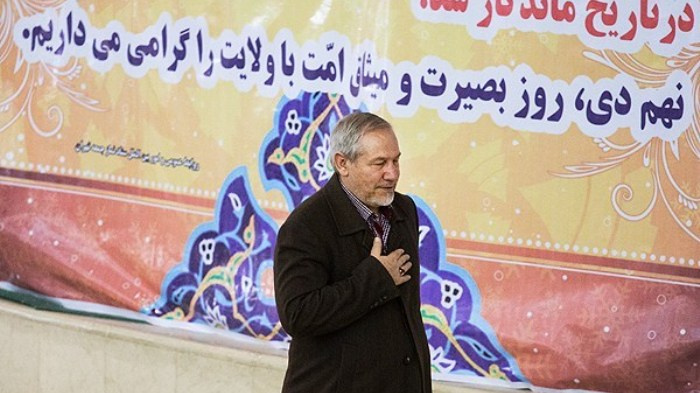Iran’s Friday Prayers: Sedition, elections and new US sanctions

(Former IRGC Commander Yahya Rahim-Safavi attends the Friday prayers. Photo: Vahid Naderi/Fars)
Two days after the anniversary of the 9th of Dey (December 30) and massive protests against the Green Movement, the main bulk of speeches in Friday prayers across the country focused on ‘sedition’, the official term for post-election protests of the 2009 presidential poll. In Tehran, Ayatollah Seddighi called the 9th of Dey a “miracle”. Just like the 8-year war, enemies could not defeat Iran, he said, adding that the 2009 sedition was much more dangerous than the 8-year war. In Yasuj, in southwestern Iran, the Friday prayers’ leader Ayatollah Hosseini warned the congregation that the 2009 sedition was not the last of its kind.
In Tehran, Seddighi demanded the audience to show an ‘insight’ similar to the one they demonstrated in 2009 to choose the right candidates for the parliament and the Council of Experts, those “who do not create a new pole against velayat”, i.e. the Supreme Leader. In Yasuj, Ayatollah Hosseini called for the citizens to “participate enthusiastically”, a common appeal before every election, taking into consideration the revolutionary credits of the candidate and choosing the best.
Washington’s plans to impose new sanctions on Iran raised the ire of Friday prayers’ sermonizers, and they warned about the consequences across the country. In Qom, in central Iran, Ali-Reza A’rafi, asserted that “Iran has demonstrated its rationality, tact and patience” but it will not retreat from the post-JCPOA red lines outlined by the Supreme Leader. A’rafi added that Iran will continue developing its missile tests and defense capabilities.
The Friday prayers’ leader in Ilam in Western Iran was also sharp-tongued, both against the United States, and President Hassan Rouhani. “We should be more pro-active” said Mohammad-Naghi Lotfi. “The only act that cuts down the United States to its size … is to stop implementing the JCPOA.” Addressing the government, Lotfi added “why are we so optimistic? Common people even know that the United States is unreliable.” Hojjatoleslam Khatami, sermonizer of Friday prayers in Zanjan, in northwestern Iran, also followed the same line: “the US is not reliable and measures such as passing new rules on visas, stealing from Iran’s frozen assets and [new] sanctions are hostile measures” he said.

